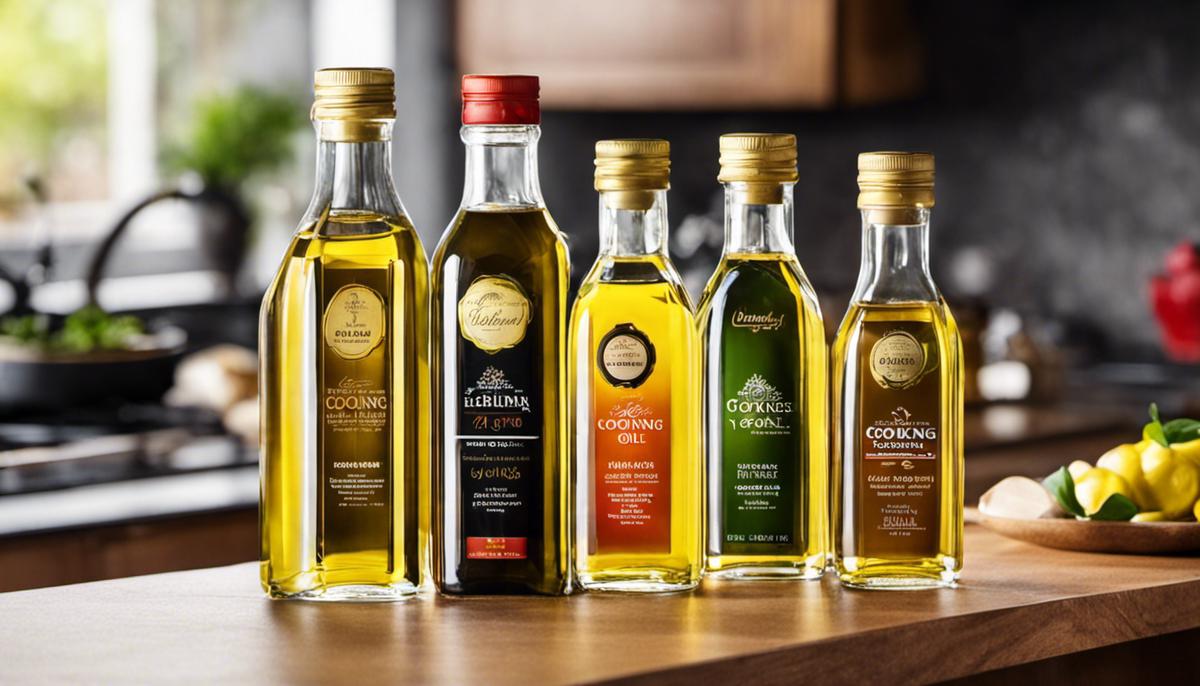Finding the Perfect Olive Oil Substitute
Ever wondered what options you have when you run out of olive oil or simply have a recipe that doesn’t require it? There’s a whole world of cooking oils that not only serve as a suitable olive oil substitute but can also add new dimensions to your regular dishes. Understanding the flavors, benefits, affordability, and culinary applications of various substitutes like canola oil, sunflower oil, avocado oil, among others, allows home cooks to explore exciting culinary opportunities, while also considering health benefits or dietary needs. This study covers all you need to know about these alternative cooking oils to help you make the best of every culinary situation.
Types of Olive Oil Substitutes
Understanding Different Cooking Oils
Before you can make an educated substitution for olive oil, it’s important to understand the properties that different cooking oils bring to the table. Cooking oils can vary immensely in their flavor profiles, smoke points, and health benefits.
Canola Oil and Sunflower Oil
Canola oil and sunflower oil are commonly used in both baking and frying due to their neutral flavor. These oils allow the taste of your recipe to shine through without contributing any unwanted flavors of their own. Canola oil is low in saturated fat and high in monounsaturated fat, making it a healthier choice for your heart. Sunflower oil, on the other hand, is full of Vitamin E and Omega-6 fatty acids, which are beneficial for your skin and heart respectively.
Avocado Oil, Sesame Oil, and Coconut Oil
Avocado oil, sesame oil, and coconut oil each offer a distinct flavor that can potentially enhance certain dishes. Avocado oil has a buttery taste and high smoke point, making it a versatile oil that can be used for sautéing, roasting, or even making dressings. Sesame oil lends a nutty, intense flavor–it’s often used in Asian cuisine to heighten the taste of dishes. Coconut oil has a sweet, subtle flavor and solidifies at room temperature—it’s perfect for baking or adding a tropical twist to your recipes.
How Cooking Oils Affect Taste and Texture
The oil you choose can dramatically affect the taste and texture of your dish. For instance, butter and coconut oil can make baked goods taste richer and give them a slightly flaky texture. If you’re looking to replicate the characteristics of olive oil without using it, you need to consider not just the flavor, but also the texture that olive oil tends to give the dish.
Remember, the best olive oil substitute depends on what you’re cooking and what characteristics you want to achieve in your dish. While it’s possible to make different cooking oils work as a suitable swap for olive oil, be prepared for the change it can bring to your dishes.

Health Benefits and Nutritional Content
Understanding the Nutritional Content of Potential Substitutes
If you’re seeking an olive oil substitute, it’s important to first understand the nutritional content it offers. Remember, olive oil is praised for its high monounsaturated fat content, which promotes heart health. However, different oils can offer unique nutritional benefits, too. For example, coconut oil, while high in saturated fats, might provide substantial amounts of medium-chain triglycerides, which have been linked to weight loss and improved brain function. Similarly, flaxseed oil is packed with Omega-3 fatty acids, which can reduce inflammation and enhance brain health.
Health Benefits of Potential Substitutes
When picking substitutes, you should also look at health benefits. Grapeseed oil, for instance, contains a significant amount of vitamin E and omega-6 fatty acids, which can have anti-inflammatory effects and promote skin health. Meanwhile, peanut oil is high in vitamin E and phytosterols, which can potentially reduce cholesterol levels.
Comparing Oils for Nutritional Value
To make your decision, adding up nutrient content or health benefits isn’t enough. You also need to consider how they fit into your overall dietary needs and preferences. For instance, if you need to limit your saturated fat intake due to a heart condition, you might opt for sunflower oil, which has a lower saturated fat content relative to other oils.
Consideration of Dietary Restrictions
If you’re substituting olive oil for dietary or allergenic reasons, such factors form the backbone of your decision. For example, those with a nut allergy would have to avoid nut oils, such as almond or macadamia. Similarly, those who follow vegan diets may choose to avoid animal-derived fats, like lard or ghee.
Other factors to consider when substituting olive oil
Some oils do not respond well to high heat, which can make them less suitable in certain cooking scenarios. For instance, flaxseed oil has a low smoke point making it unsuitable for frying or sautéing, whereas avocado oil has a high smoke point making it ideal for these uses.
Remember, understanding your dietary requirements and health objectives is key while selecting olive oil substitutes. Also, consider how your substitute integrates with your cooking style and overall diet plan. Try experimenting with oil substitutes in different recipes and vary your intake to achieve a balanced diet.

Affordability and Availability
Understanding Olive Oil Substitutes in terms of Cost
When considering substitutes for olive oil, a key factor that must be taken into account is the cost of the alternatives. There is a wide range of possible substitutes that include grapeseed oil, avocado oil, canola oil, peanut oil, sesame oil, and coconut oil. Each comes with its own price tag that may significantly vary from the cost of olive oil. Before deciding on a substitute, compare the prices of these oils in your local market or online stores.
Availability: Finding Olive Oil Substitutes in Local Stores
Convenience is another factor that comes into play when considering olive oil substitutes. Not all types of oil may be readily available in your local grocery store. You might be able to find common alternatives like canola or sunflower oil in most places, but others like avocado oil or grapeseed oil might be more difficult to source. Checking your local supermarket or nearby health food store can provide a gauge of what’s regularly available.
Exploring Health Benefits of Olive Oil Substitutes
Several substitutes for olive oil offer a variety of health benefits. For instance, flaxseed oil is a good source of omega-3 fatty acids, while avocado oil is rich in monounsaturated fats that are beneficial for heart health. Coconut oil, although high in saturated fat, has unique fatty acids that can boost metabolism. However, these health benefits can come with a higher price tag, so it’s essential to weigh up value for money and your health objectives.
Factoring in Flavor in Olive Oil Substitutes
The flavor profile of your substitute oil should also be considered. The oil you choose will affect the flavor of your dish. For instance, coconut oil imparts a distinct tropical savory note, which may not work well in all recipes. On the other hand, canola oil has a relatively neutral flavor, making it a more versatile choice if taste is a concern.
Researching Potential Olive Oil Substitutes
Determining the best substitute for olive oil in your kitchen involves conducting some research. Online platforms, local supermarkets, or consulting with dietitians can offer valuable insights into the cost, health benefits, flavor, and availability of the various options. In the end, the best substitute for olive oil is one that fits your budget, your taste profiles, and health objectives, as well as being readily available in your locality.

Culinary Applications
Understanding Olive Oil Substitutes
Selecting an ideal olive oil substitute depends on the culinary activity you plan to undertake, given that different oils have variable behaviors under heat. The basic guideline involves understanding the smoke points of oils, the temperature at which they start to break down and produce smoke. Oils with high smoke points are favorable for cooking methods like frying, whereas oils with low smoke points are suitable for cold applications like dressing salads.
High Smoking Point Substitutes
Canola oil, sunflower oil, and avocado oil are among the ideal olive oil substitutes when cooking under high heat. These oils have high smoke points, which makes them excellent for frying, sautéing and roasting.
Canola oil is the most versatile alternative to olive oil with a smoke point of about 400°F (204°C). Its light flavor doesn’t overpower the tastes of dishes and is an excellent choice for frying or sautéing.
Sunflower oil, with a smoke point of 440°F (227°C), is ideal for frying. However, it’s also suitable for roasting and sautéing due to its neutral taste.
Avocado oil boasts the highest smoke point, around 500°F (260°C), making it perfect for searing, grilling, and frying. It also has a mild flavor that pairs well with various dishes.
Low Smoking Point Substitutes
For applications that don’t require heat, such as salad dressings or dips, an oil with a lower smoke point like flaxseed oil or pumpkin seed oil can be ideal substitutes. These oils have robust flavors that can significantly contribute to a dish’s final taste.
Flaxseed oil has a low smoke point and a distinctly nutty flavor, making it perfect for cold applications. It is highly nutritious and often used in salad dressings or drizzled over dishes after they have been cooked.
Pumpkin seed oil also has a low smoke point but a rich, nutty flavor, making it ideal for salad dressings or for finishing dishes.
In conclusion, substituting olive oil depends greatly on what you’re cooking and how you’re cooking it. However, with a range of versatile options available, there’s always a suitable oil for every culinary application.

Having explored the array of alternatives to olive oil, it’s evident that the choice of a substitute lies in the requirements of the recipe, the type of cuisine, the specificity of flavor desired, and most importantly, health considerations. With each oil offering unique properties, from the neutral flavor of canola and sunflower oil, to the distinct taste of avocado, sesame, and coconut oil, the possibilities can be as creative as one allows. At the same time, it’s crucial to consider the nutrient composition, cost, and availability of these oils, striking a balance between flavor, health, and economic factors. Consider this as an opportunity to experiment and discover new flavors, health benefits, and extraordinary dishes.
Writio: AI-powered website content writer and rank tracker. This article was crafted by Writio.

